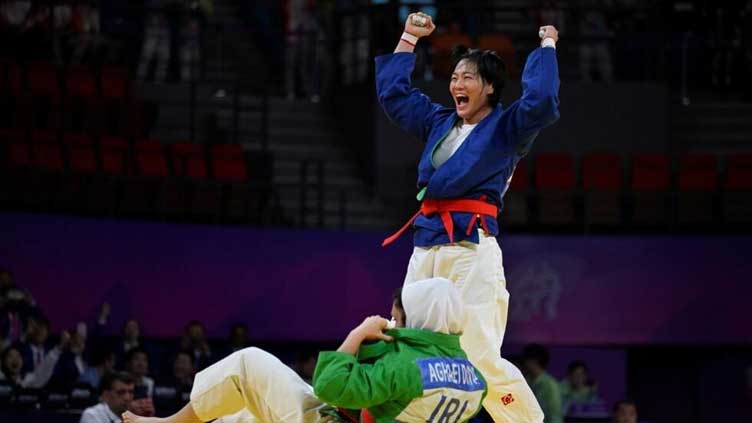Kurash course! New athletes, fans take to ancient martial art at Asian Games

Sports
Spectator Li Jingxiu told AFP he "knew nothing at all about sport" before showing up to competition
Hangzhou (China) (AFP) – Once a fixture of traditional wedding ceremonies and a pastime of ancient warriors, centuries old martial art of Kurash is winning new fans and attracting first-time competitors at the Asian Games in China.
Spectator Li Jingxiu told AFP he "knew nothing at all about the sport" before showing up to Sunday's competition.
But the 20-year-old quickly became enthralled by the central Asian martial art, where fighters don green and blue jackets and aim to throw their opponents to the floor without any ground moves.
"It turned out to be pretty spectacular, especially the girls from Chinese Taipei, who were much smaller than other countries' fighters but fought very hard anyway," Li said, referring to the official name under which Taiwan is competing.
Kurash only became a medal event at the Jakarta Asian Games in 2018 and the spectators in Hangzhou are not the only newcomers to intricacies of the little-known sport. The Asian Games Kurash events feature athletes from countries and territories outside its central Asian heartlands taking part for the first time.
Many have switched from judo, and inevitably some were defeated in seconds by their experienced opponents from countries such as Uzbekistan, who dominate the sport.
Jackielou Escarpe, from the Philippines, told AFP he was one of the competitors who had switched to the sport from judo, believing he would have a better chance of winning a medal.
"In judo I must prepare to play ground games, so it's a big adjustment to me in playing Kurash," Escarpe said after being swiftly defeated in his first Asian Games Kurash bout by Uzbekistan's Umid Esanov, who went on to win the gold medal in the men's 81kg class.
"In Kurash (it's) all standing takedowns so I have to change my game plans." 'It is a challenge' He hopes his participation in the Asian Games will enable him to promote the sport back home in the Philippines, where it has few practitioners. "We start now with (Kurash clubs) in three provinces, so hopefully we can spread it a lot," he said.
Kurash moves are graded based on the control, force and speed with which they are executed, with opponents bowing to each other before and after each bout. One perfectly executed throw can the contest in the blink of an eye.
"It requires a lot of technique, and you have to keep improving your technique," said Taiwan's Huang Chun-ta, a judoka with 30 years of experience.
All the gold medallists had been from Turkmenistan, Kazakhstan or Uzbekistan until China's Yu Dan on Sunday bucked the trend.
She wildly celebrated winning the women's 70kg final, making history as China's first Kurash gold medallist, and delighting the home fans in the Xiaoshan Linpu Gymnasium.
Yu said she relished the difficulty. "It is a challenge to athletes and increases the athletes' flexibility."
Up in the stands, spectator Li was impressed: "The entertainment factor is definitely there."

